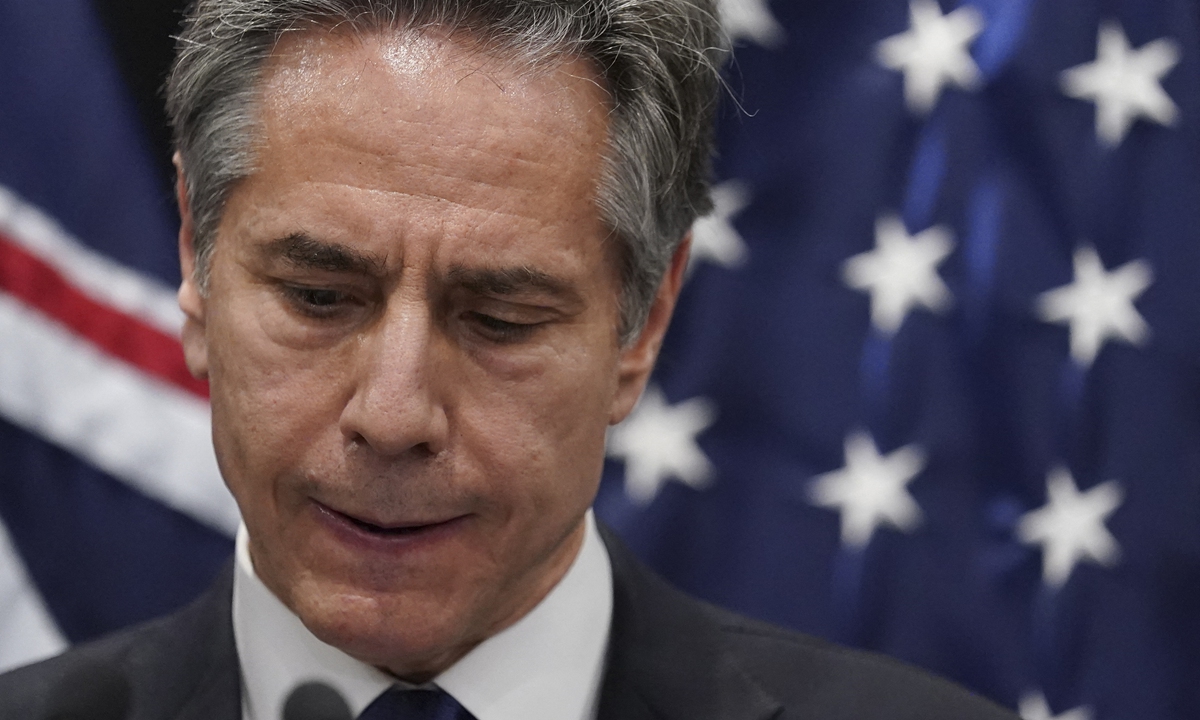
US Secretary of State Antony Blinken Photo: AFP
Hours ahead of US Secretary of State Antony Blinken's scheduled speech to outline the country's "China strategy," the State Department announced to postpone it due to Blinken's positive test result for COVID-19.
When asked about the change of plans of the US senior official at Thursday's routine news conference, Chinese Foreign Ministry spokesperson Zhao Lijian said that the Ministry wished Blinken a speedy recovery.
While noting that he will not make comments on a speech that has not yet be delivered, Zhao stressed that the development of healthy and stable China-US relations is in line with mutual benefits and is also the general expectation of the international community.
The Foreign Ministry spokesperson noted that in the recent call between Chinese President Xi Jinping and US President Joe Biden, both sides agreed that the two countries should respect each other, coexist in peace and avoid confrontation. Biden also reiterated that the US does not seek a new Cold War; does not aim to change China's system; the revitalization of its alliances is not targeted at China; the US does not support "Taiwan independence"; and it has no intention to seek a conflict with China.
"We hope the US will put into practice President Biden's positive statements on this and abandon the old and outdated zero-sum thinking of the Cold War," he said. "The US should implement the consensus of the two heads of state as seriously as China does, focus on cooperation and promote an early return to the right track of healthy and stable development in China-US relations."
While this view has also been put forward by some US scholars and advisors, the odds are that China's cooperative attitude will not be reciprocated by the US, observers told the Global Times.
Blinken's long-awaited speech is expected to showcase the Biden administration's position on China relations and foreign policy objectives toward China for the first time since Biden took office.
"As the US is mulling to appropriate $33 billion to Ukraine to continue to fan flame of war while inflation at home is almost unbearable, the time has come for it to make a choice - whether to adopt a great power rivalry posture toward China or a great power cooperation posture," Lü Xiang, research fellow at the Chinese Academy of Social Sciences, told the Global Times.
Unfortunately, US policy toward China is not likely going to change, another Beijing-based expert on China-US relations who requested anonymity told the Global Times. "In fact, there are few shifts or details to be expected."
While Russia and Ukraine are embroiled in conflict, the US attitude toward China is one of wanting to both draw in and crack down, he said. This can be seen in a series of recent statements vilifying China and forcing it to choose sides on the Ukraine issue, he said.
Experts noted the US is also expected to continue to pressure China over the Ukraine crisis for some time to come.
"The US will do everything it can to damage the relationship between Russia and China. The smear campaign against China is a long-term strategy," Lü told the Global Times.
China has clarified on various occasions that Russia has not asked China for assistance regarding weapons or strategic materials, nor has China provided any.
Yet once again, in the Ukraine crisis, the US is, as usual, attempting to drag China into the crisis and making the world listen to its fabricated China threat theory, said the anonymous expert. "This is a consistent practice of the US and is extremely pathological."
"In the Indo-Pacific region, the US will do the same - deliberately create conflict when China is always seeking peace," he said. "NATO will also be pushed into the Asia-Pacific to address the so-called 'Chinese challenge.'"
Nonetheless, experts also pointed out that the Indo-Pacific strategy pursued by the US in recent years has been repeatedly frustrated, and ASEAN countries are not as tightly united as the US expected to cater to US interests.
"This should make the US realize that its national strength superiority is no longer sufficient to have absolute control over international relations," said Lü. "Some countries that don't want to choose sides will instead become increasingly alienated from the US."
The development of China-US relations will remain a tug-of-war process, said the expert who spoke on condition of anonymity.
"China wants cooperation to be part of the main theme, but the US believes that cooperation is only a stopgap measure and that competition prepares the ground for confrontation," he said, noting the US will continue to treat China as its biggest strategic competitor, while the scope for cooperation will be limited from the US perspective.
Biden is scheduled to visit Asia on May 20 to meet with South Korea's new president, Yoon Suk-yeol, and Japanese Prime Minister Fumio Kishida. Biden will also attend the US-Japan-India-Australia "quadrilateral mechanism" leaders meeting in Japan, which is expected by the US media to target the "threats" of China and North Korea.




